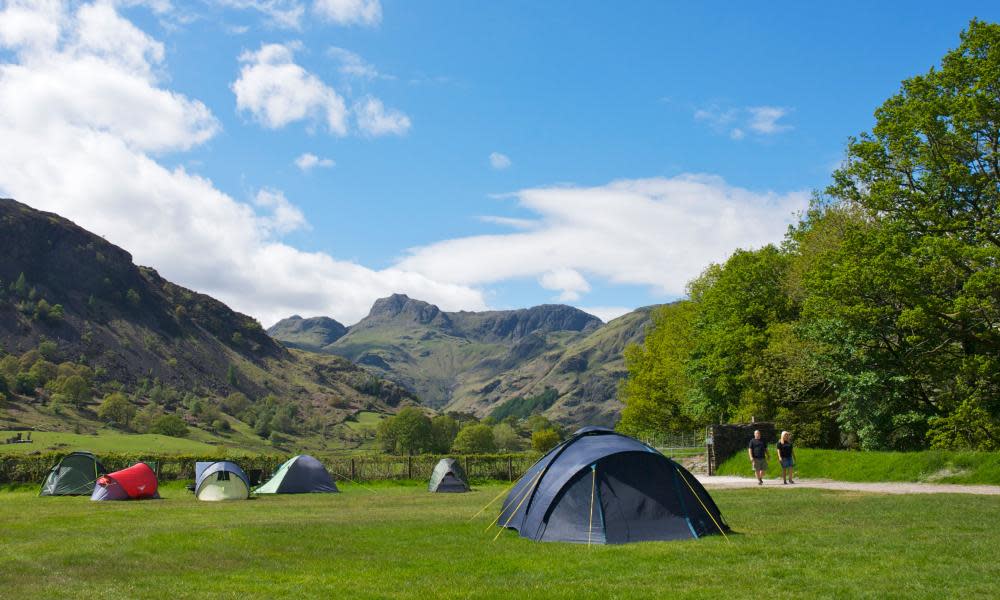Campsites face a summer of social distancing

On 4 July caravan and campsites and self-catering accommodation are expected to reopen in England, an announcement that has brought sighs of relief from many, and a shudder of fear to some. This may be a welcome chance for many to get away, and for some businesses to finally salvage their summer season, but a significant movement of people could unleash a hostile reception in traditional holiday areas or, worse, a localised outbreak of Covid-19.
After more than three months of restrictions, and the best spring weather on record, a stampede may seem inevitable, but will campsite owners want to risk local ire, or even be able to adapt? This could be the summer when the British rediscover the holiday potential of their own country, or the one remembered for “GO HOME” signs and overloaded local hospitals. For those in search of a summer holiday, the question is how best to negotiate this tricky situation?
Camping and caravanning were already hugely popular before the virus: Britons made around 40 million overnight stays in 2019, according to Visit Britain. The economic value of the industry is enormous. The Caravan and Motorhome Club estimates that its members spend £700m a year in and around the 2,500 sites it either operates or certifies. But there are huge potential challenges: camp and caravan sites usually have shared toilet and shower facilities in which hygiene standards can easily slip, and nearby shops and beauty spots can easily get overcrowded.
Oliver Muntz of Umberslade campsite near Warwick has noticed concern among would-be holidaymakers. “Bookings for July are quite slow: callers are asking a lot of questions about spacing and cleanliness.”
Bookings for July are quite slow: callers are asking a lot of questions about spacing and cleanliness
Muntz says glamping may have an edge, as large tents, yurts and tipis often have en suite facilities. Tom Dixon, co-founder and director of Canopy and Stars, thinks the 600 treehouses, cabins, yurts and wagons on his books are eminently suitable for post-lockdown holidays. “Glamping spaces tend to be remote and rural by nature,” he says. “The vast majority of our places are on their own or at a safe distance from other units.”
Canopy and Stars has brought in a commitment to deep clean all accommodation, increasing time between visitors to allow for this. “We’ll also be making sure stocks of cleaning supplies are kept up for guests,” says Dixon, “and reduce risks by, for example, removing frequently touched items like guestbooks.”
In North Yorkshire, Lia Martinucci had planned to expand her new glamping site, MyHappyPlaceUK near Richmond, with 12 luxurious bell tents dotted around her farmhouse. Her local MP is chancellor Rishi Sunak, to whom she wrote in May asking for help. “We are not hotels,” she says. “There are few social-distancing problems with us, and our local economy desperately needs a good season.”
The chancellor has yet to reply and, like other campsite owners, Martinucci says bookings are slow. “People are being careful with their money,” she says, “and I don’t blame them.” The threat of a second-wave clampdown and lost deposits is a big dampener.
Self-catering accommodation providers are being quick to headline more isolated properties: Under the Thatch is even flagging up cottages just inside the English border, a reminder that Wales and Scotland are not included in the 4 July reopening date. “Lots of our properties are down their own lanes with no neighbours at all,” says director Greg Stevenson.
But what about those “Go Home” signs? Should we be worried about a hostile reception? Martinucci thinks not. “The kind of people we get are careful, and follow all the advice. What we need is clear, appropriate guidelines, then everyone knows what to do and how to stay within the rules.”
Cumbria Tourism managing director Gill Haigh agrees: “We urgently need government guidance that helps businesses meet national standards, but also reassures visitors and encourages them to book.”
Muntz says co-ordination with other local businesses is vital. Umberslade has been busy forming links with local farms, cafes and shops to make following social distancing guidelines possible. “We’ve made a walk up to our local dairy farm, where people will be able to get breakfast packs and other foodstuffs.”
He has also been busy planting wildflower meadows and devising a walk through the Umberslade Estate, for which campers will have timed entries. “It’s a good chance to find new ways of operating,” he says.
Perhaps ‘“new ways of operating” is everyone’s mantra now. Website Gumtree has noted a significant upsurge in demand for campervans, paddleboards and kayaks, but the biggest leap of all suggests some people are resigned to a holiday at home. Searches for 10-foot swimming pools are up 405%.


